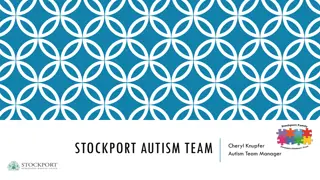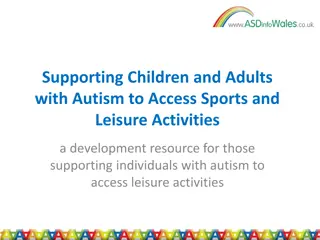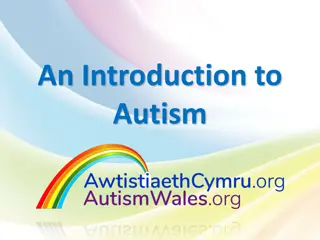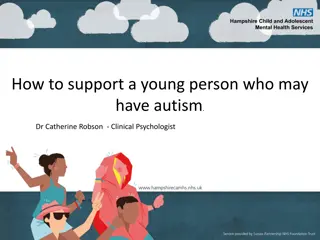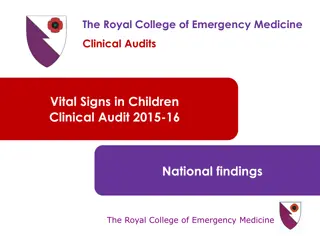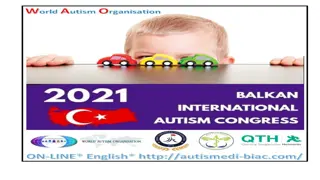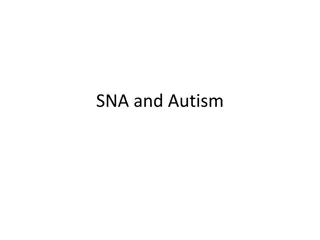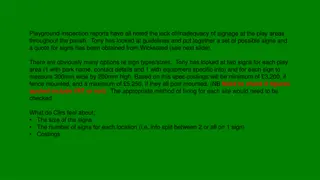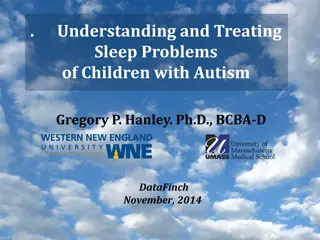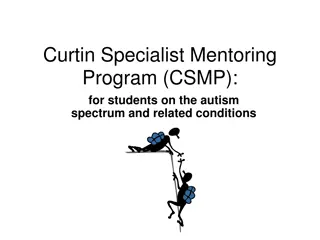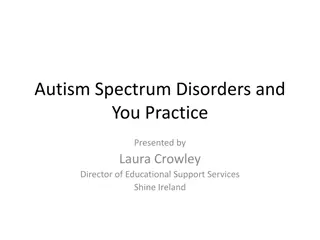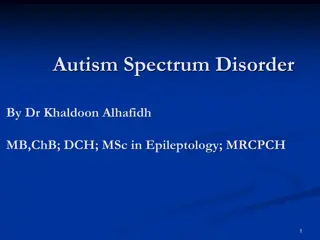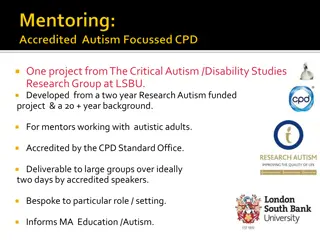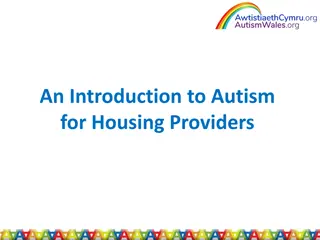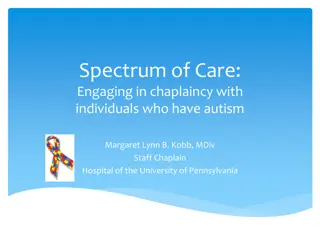Understanding Signs of Autism in Children
The main features of Autism Spectrum Disorder (ASD) include social communication and interaction challenges. Symptoms in pre-school children may include delayed speech development, lack of response to their name being called, intolerance of personal space, disinterest in interacting with others, and repetitive behaviors. Recognizing these signs early can help in seeking timely support and intervention for children with ASD.
Uploaded on Sep 16, 2024 | 0 Views
Download Presentation

Please find below an Image/Link to download the presentation.
The content on the website is provided AS IS for your information and personal use only. It may not be sold, licensed, or shared on other websites without obtaining consent from the author. Download presentation by click this link. If you encounter any issues during the download, it is possible that the publisher has removed the file from their server.
E N D
Presentation Transcript
Symptoms of Autism The main features of autism spectrum disorder (ASD) are problems with social communication and interaction. See your General Practitioner or health visitor if you notice any of the following signs of ASD in your child or if you re concerned about your child s development. General Practitioner :
Signs of ASD in pre-school children Spoken language delayed speech development (for example, speaking less than 50 different words by the age of two), or not speaking at all frequent repetition of set words and phrases speech that sounds very monotonous or flat preferring to communicate using single words, despite being able to speak in sentences monotonous : flat:
Responding to others not responding to their name being called, despite having normal hearing rejecting cuddles initiated by a parent or carer (although they may initiate cuddles themselves) reacting unusually negatively when asked to do something by someone else cuddles :
Interacting with others not being aware of other people s personal space, or being unusually intolerant of people entering their own personal space little interest in interacting with other people, including children of a similar age personal space : Intolerant:
not enjoying situations that most children of their age like, such as birthday parties preferring to play alone, rather than asking others to play with them rarely using gestures or facial expressions when communicating avoiding eye contact Gestures:
Behaviour having repetitive movements, such as flapping their hands, rocking back and forth, or flicking their fingers playing with toys in a repetitive and unimaginative way, such as lining blocks up in order of size or colour, rather than using them to build something flapping : rocking : flicking :
preferring to have a familiar routine and getting very upset if there are changes to this routine having a strong like or dislike of certain foods based on the texture or colour of the food as much as the taste unusual sensory interests for example, children with ASD may sniff toys, objects or people inappropriately sniff :
Signs and symptoms of ASD in school-age children Spoken language preferring to avoid using spoken language speech that sounds very monotonous or flat speaking in pre-learned phrases, rather than putting together individual words to form new sentences seeming to talk "at" people, rather than sharing a two-way conversation monotonous : flat:
Responding to others taking people s speech literally and being unable to understand sarcasm, metaphors or figures of speech reacting unusually negatively when asked to do something by someone else sarcasm : metaphors : figures of speech:
Interacting with others not being aware of other people s personal space, or being unusually intolerant of people entering their own personal space little interest in interacting with other people, including children of a similar age, or having few close friends, despite attempts to form friendships personal space : Intolerant:
not understanding how people normally interact socially, such as greeting people or wishing them farewell being unable to adapt the tone and content of their speech to different social situations for example, speaking very formally at a party and then speaking to total strangers in a familiar way
not enjoying situations and activities that most children of their age enjoy rarely using gestures or facial expressions when communicating avoiding eye contact gestures :
Behaviour repetitive movements, such as flapping their hands, rocking back and forth, or flicking their fingers playing in a repetitive and unimaginative way, often preferring to play with objects rather than people developing a highly specific interest in a particular subject or activity flapping : rocking : flicking :
preferring to have a familiar routine and getting very upset if there are changes to their normal routine having a strong like or dislike of certain foods based on the texture or colour of the food as much as the taste unusual sensory interests for example, children with ASD may sniff toys, objects or people inappropriately sniff :






